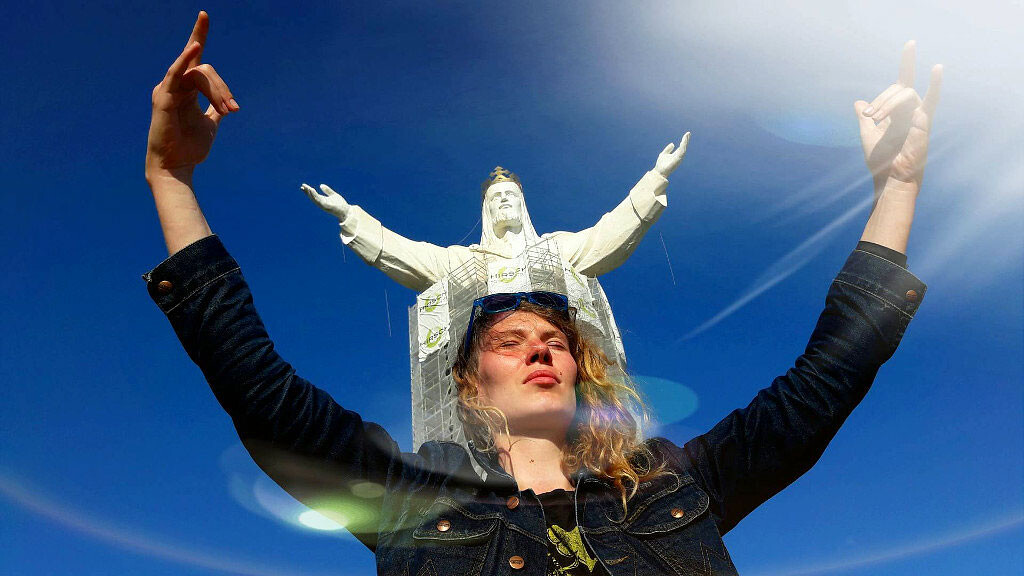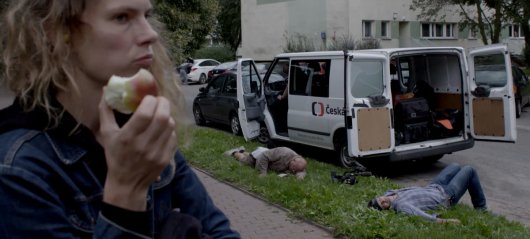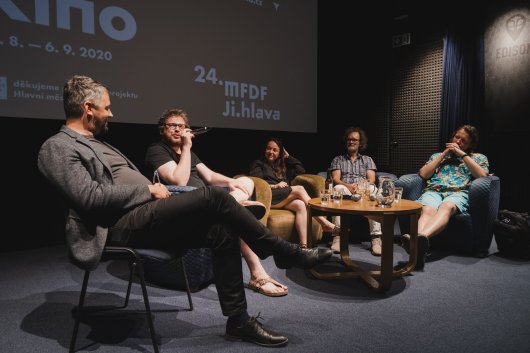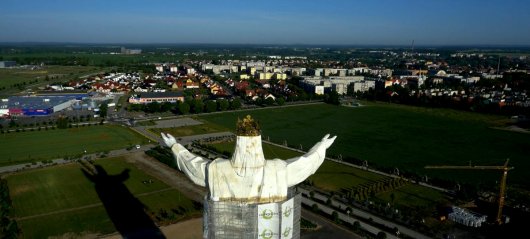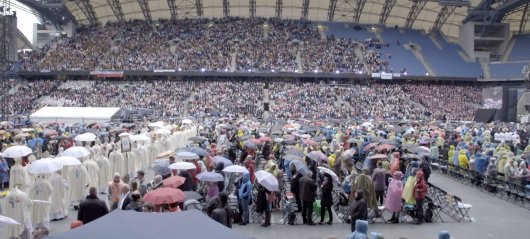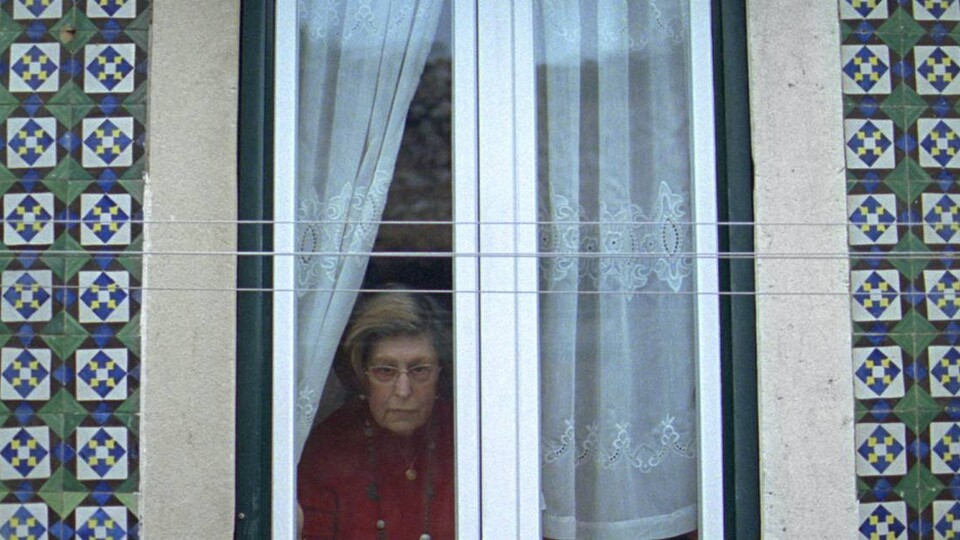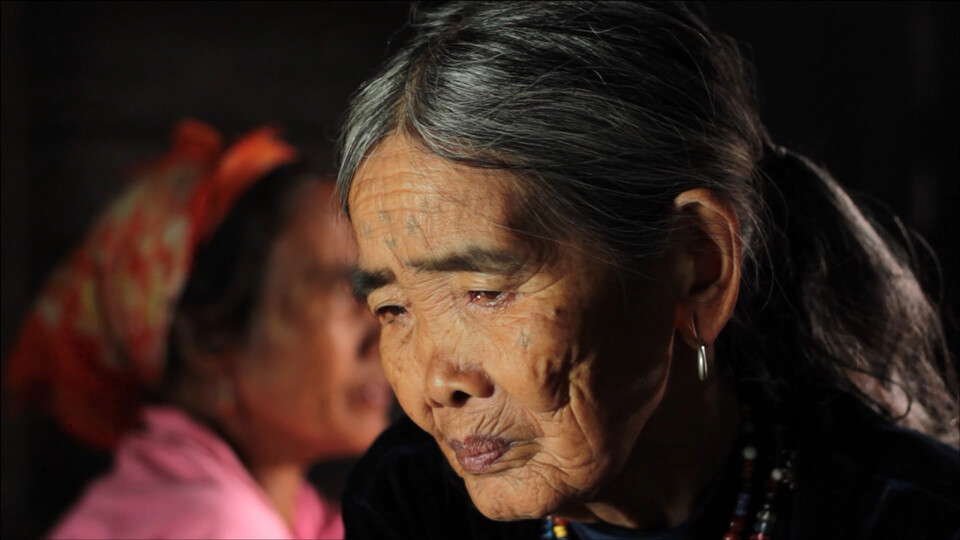Going to the Polish Turf with Our Own Team
How do you work in your team? Do you have clearly defined roles? For instance, that Vít Klusák is behind the camera?
Filip Remunda (FR): When we were shooting Czech Peace we had this arrangement with Vít behind the camera. Now we went back to the same setup. My role was to communicate with people in Poland and also with researchers – Polish participants in workshops organized by the Institute of Documentary Film, including our main collaborator Konrad Szołajský. With him, we thoroughly discussed the details of the Polish situation as well as the choice of the film’s protagonists, who will enable us to speak about it.
Vít Klusák (VK): It was actually an improvised that I was behind the camera because after the very first day of shooting we unexpectedly had to say goodbye to our cameraman and there was no one else around in Poland who could take his place. We also knew that we would work better as a team with me behind the camera because we were used to it. The shooting of this film was so complex and difficult in terms of its form that anything automatic between me and Filip came in handy. Although I was initially determined to be neither mentally nor physically burdened with the camera, it just turned out this way…
What made the shooting so complicated? Can you be more specific?
VK: It was a box inside a box, a movie inside a movie, and we didn’t know the language of the country where we were shooting it because Karel doesn’t speak Polish and me neither. Only Filip does, he speaks about ten languages, he is the perfect prototype of a polyglot. But we had to translate every word for Karel. The interpreter would have been constantly disturbing the shooting, if we hadn’t found a very sophisticated solution where Karel was permanently wearing a wireless earbud and his interpreter was hiding somewhere out of sight.
FR: The shooting was difficult because we were working in two different language environments. We had to have two crews and deal with the different dynamic of the Czech and the Polish crew. Writer Mariusz Szczygieł recently pointed out that in Poland Czechs are seen as people, who always have plenty of time, while the Polish are more predatory, but I have a completely opposite impression. We wanted to keep working for sixteen hours, day and night, but the Polish crew were all about sticking to the work regulations and regular hours.
Documentary crew of Once Upon a Time in Poland. Left: Karel Žalud, middle: interpreter, right: sound engineer Michal Gábor. Photo: Czech Television.
VK: Maybe they thought that the less we shoot, the less chance there was to get in trouble. We even felt like some of the Polish crew members were slightly censoring us because they didn’t like that we were revealing some things about their country that they wouldn’t want the world to know.
FR: When you meet a group of Czech people abroad you often hear them complaining about Czechia and telling everyone around how horrible Czechs are. But I have realized that the Polish and other nations have a completely different attitude. They stick together. For instance our sound engineer from the Polish team, with whom we became friends during the shooting, was afraid that we were creating a pamphlet mocking the Polish nation. After the film’s recent world premiere in Warsaw he was thankful saying that this film is important in the European context, and not only for Czech or Polish people, because it brings a message about our divided world and about the consequences of digging deeper trenches between us.
Wasn’t one of the causes of the misunderstanding between the Czech and the Polish crew our different attitude to faith?
VK: That was another important issue – superstitions and concerns relating to faith. When we were shooting with an exorcist, our Polish producer refused to go with us because, as she put it: you shouldn’t mess with these things. I have to admit that we were first making fun of it but when Filip pinched our Czech producer Alžběta’s finger in a car door, I was telling to myself that that’s what we get for playing with the devil. It’s rooted somewhere deep inside of us – some natural respect. I caught myself having the same concerns I had been laughing at before. I can understand that when you actually encounter these obscurant practices for the first time, they have some deceptive magic, and those who call themselves exorcists know that if you are scared you will swallow the bait.
FR: I feel safe because I believed that we were all the time on the side of the good.
VK: That reminds me of the exorcist’s test.
What was this “exorcist test” about?
VK: He told us he was going to fetch a relic, and then he brought a fragment of a shinbone of some Italian saint framed in ebony. He said he would place it on the top of our head and if nothing happens, we are alright. I got a brilliant idea that I will do something crazy, start yelling or convulse in agony. But Filip begged me not to.
The film crew of Once Upon a Time in Poland. Photo Czech Television
FR: I don’t think this is what happened, I remember this part differently. When the exorcist put the thing over Vít’s head I was telling to myself how funny it would be to start shaking or something. And I told Vít afterwards.
VK: God knows how it was… Anyway, the exorcist also said he knew this trick with the holy water. He secretly mixes holy water with mineral water and if someone is possessed, they start spitting out and throwing up the water. They call it the materialization of evil.
Now back to the beginning of your film project. The film’s producer Zdeněk Holý approached you with a concept. What was it about and what drew you into this project?
VK: Its work title was “Pepik the Czech Goes to Poland in a Quest for the Love of God” and we were supposed to create another Czech Švejk, or me and Filip become “documentary Švejks” and venture to Poland together. But we didn’t like the idea of two Czech documentary makers going somewhere with their camera to mock other people from their position of power. It didn’t seem fair, so we decided to focus the lens on a group of five Czech people. I framed it to myself as a football match – we were going to the Polish turf but with our own team to play a fair match. Initially, we envisaged a journalist and a photographer instead of a documentary film crew, but then we remembered how we used to regret that we hadn’t recorded any scenes from our previous film projects. We always quarrelled with our sound engineer Michal Gábor and teased one another on the way home from the set after some intense shooting situation. We had exciting discussions in the car, which we never actually recorded.
FR: One of such situations occurred during a filming session in Italy close to a US military base in Vicenza where we were all of a sudden surrounded by three armoured vehicles with fully armed and camouflaged soldiers with barking dogs. They shouted something like: “For our and your own safety, stand up behind the car!” It was like in some American criminal thriller. I hissed to Michal Gábor to turn on the recording. Me and Vít blinked at each other knowing that if we reached for the camera we could become a shooting target. But Michal didn’t turn on the recording. When the Italian Carabinieri arrived, they called off the US soldiers, checked our documents and then left. Michal confessed that he had thought they would take us to Guantánamo.
VK: The fact is that we were actually standing two meters away from a giant US military base and I was shooting the fence which was signed “Shooting forbidden!” so his concerns were quite justified.
FR: Alright. But how do you capture this on film? With Vít we anticipated many stressful and intense moments like this one also in Poland, which would end up in further car discussions. So we decided that we will give ourselves a treat by shooting these situations and our following communication.
VK: I would say that half of the fun was the idea that we would be shooting behind the scenes of our own shooting. This was a very important moment for us. We also thought that this method could be formally interesting and surprising. But most of all, we were naturally interested in how religion and faith, things so personal and fragile, can be used in mass manipulation, for political purposes and to manipulate people through media.
Why did you choose a real documentarian – Karel Žalud – as the protagonist of your film? Initially, you wanted to work actor and director Miroslav Krobot...
FR: It’s true that we first asked Miroslav Krobot to play the filmmaker and Miroslav Bambušek to appear in the film as a sound engineer. But Bambušek’s headset was constantly falling off and it was soon quite clear that Krobot, who was not a documentary maker, had nothing to stick to and needed something scripted. So we decided to find authentic documentarians and the situation further evolved. If it was a theatre drama, the actors would follow a script, but this was reality.
VK: We were also considering giving the protagonists nicknames and have them portray different character types. But that was actually their own suggestion, because they were afraid they would look silly playing themselves.
The discussion with directors following the screening of the rough cut of the film as part of the Living Cinema project in Prague. Left: producer Zdeněk Holý, speaking: Vít Klusák, far right: Filip Remunda, to the left: sound engineer Michal Gábor. Photo: Ji.hlava IDFF
FR: Our sound engineer Michal Gábor says that if some of his friends don’t like the movie, he would just say that it was only a role he had to play and that it was all scripted. We chose Karel Žalud for the role of a documentarian because he can be quite provocative although he is a sensitive and fragile guy. His films are full of irony and humour, but also very insightful, and we love his creative approach. We knew that in some of the church scenes he would be like a bull in a china shop, but at the same time that the situations would shake him because he is very sensitive.
VK: We were thinking of Jan Gogola jr. as a backup for that role, but we never approached him because we were afraid that he would steamroll the film with his unique signature. He would take over completely. We soon realized that our protagonists have to be authentic as documentary filmmakers who are directing their own film. They are really creating a film, only Karel didn’t have the entire composition of the project in his head; but he actually directed individual scenes in the film.
You had him direct the actual scenes?
VK: Yes, Karel for instance instructed the camera operator how to shoot a certain scene. He has a lot of space in the film, he was asking most of the questions in the film as if he was shooting his own documentary.
FR: But the main difference is that Karel was not the author of the script, he did not go scouting, and didn’t know the concept of moving from the Czech border towards the Baltic Sea, he didn’t know whom he would be meeting on the way and what exactly they would be talking about. Our method consisted in throwing Karel and the whole crew in a situation which they often knew nothing about until the very morning of the shooting day. But me and Vít had been visiting Poland for a long time, looking around.
VK: Anyway, the whole crew became authentically involved in the shooting. For instance, in the exorcist scene, even the cameraman Martin Matiášek asks a question – which often really happens to us during shooting because we like to collaborate with people with interesting insights.
FR: Also for the purposes of this scene, the sound engineer asked the exorcist to stick his cross to the cassock to prevent rustling in the microphone that was stuck underneath his shirt. He also wanted to ask if the priest could take it off completely but the Polish interpreter refused to translate that part – and we were happy about it, because that we exactly the kind of Czech-Polish confrontation we were waiting for.
Did you give Karel Žalud a free hand in the situations that you set up for him, or did you tell him what to say?
FR: Our method evolved gradually. We were learning how to work together and we went through some rough patches of mistrust in the team. As we found out during the shooting, the film crew led by Karel Žalud did not feel at ease when they were to shoot something they knew nothing about and in unknown locations. We had fights about it. Me and Vít didn’t want the film to only show photogenic expressions of mass Catholicism on big stadiums because that would be superficial. We wanted to capture the whole psychological landscape of Poland, not only the Catholic circus.
VK: We knew that we had to build the scenes based on who the people really were and so we cast real filmmakers. We also knew their attitude. Looking back I have the feeling that they started to become more and more their own selves even without our encouragement. It was perhaps easier to take off the mask – everyone wants to be seen, heard and taken into account, it’s our essential need to stand for ourselves, to make our own statement. They first wanted to know how to play themselves but then they gradually became themselves. Karel, too, started to reveal more about himself and about his struggles with alcohol. As if you turn off autocorrect. It was perhaps also the fact that the shooting in Poland took many years. It was a terrible circus...
FR: That’s right we had ten cars, not at all typical for a documentary crew.
From the film Once Upon a Time in Poland. Photo: Czech Television
Ten cars? Why so many?
FR: Well you have two cars with camera equipment, two cars with the crew, two for production – Polish production and the Czech one. That’s why we weren’t able to shoot some of the scenes at all – for example, protests in Krakow in support of women’s rights never made it into the movie.
Why didn’t you introduce your crew to your preparatory research? Was it important that Karel Žalud asks simple or even naive questions?
FR: To us this awkwardness was a big plus. Otherwise we would not have made the scene with Karel’s confession, which I think is one of the film’s most powerful scenes, because Karel didn’t know exactly where he was going and who he was going to meet.
VK: We wanted our crew to meet these people for the first time and then to capture the authentic situations in which they explore some specific topic and react to it on the spot.
FR: Towards the end of the shooting, we were all on the same page. One of the final scenes that we were shooting was with a family listening to Radio Maryja. All of us already knew what we wanted to shoot and how. It was much better than in the beginning, we just needed to get in tune. That was a part of our method. The film took five years to shoot. Some projects suffer from being rushed, but we had enough time to tune in to one another, take our time to shoot and do the editing. Each film is in a way your debut because you are trying to invent a new method for it. We are not shoemakers who make the same shoes all over again. We both felt like we were starting from scratch.
To what extent did you see Karel as a comic figure, the legendary Švejk or Pepi as originally suggested?
FR: The “Czech Pepi” si quite misleading, that title was proposed by producer Zdeněk Holý, but we didn’t like it and first renamed the film as “Polish God”. The “Czech Pepi” concept was not ours. The Polish refer to the Czechs as “Pepis”. They have the Czech language associated with films by Jiří Menzel and Bohumil Hrabal’s books and they see us as palaverers. Czech language sounds like babbling to them and we seem infantile. This might be the result of the hierarchical character of the Polish society, where the Polish as former noblemen can’t imagine how a milker and a philosopher can talk to each other for instance at a football match – to exaggerate it a bit. It was actually an advantage that we were simply seen as “Pepis”, no matter what we did. We didn’t have to act funny to seem funny to them.
VK: But it is true that Karel used to take food that was served in hotels for breakfast to snack on later during the day. We were also tempted to shoot that.
The film includes a reference to a pâté that Karel always brings along...
VK: That illustrates Karel’s dietary habits at that time. He didn’t know what rocket was for instance.
FR: That’s true. We went to a pizzeria in Warsaw that was called Rocket – “Rukola” and they had these huge images of rocket printed on their tablecloths. Karel was asking what it was. “Please translate what ‘rukola’ means in Czech,” he asked.
VK: So what you see in the film is not stylized. Karel has for many years been trying to build up this image of a worker of documentary cinema, to some extent this is camouflage that he likes to put on and hide behind.
How does your latest film fit in with your previous joint projects: Czech Dream and Czech Peace? I read in media that it is actually a trilogy – is that right?
VK: We made that connection only in retrospect and actually in response to a question we were asked by the media. The common thread is manipulation – buying all sorts of rubbish in the Czech Dream, political marketing and advocating for an American military base to be built at a former Soviet missile site in Czech Peace. With Filip we also made Free Smetana, where the protagonist didn’t want to participate on the promotion of politicians whom he considered morally corrupt... Film critic Kamil Fila claims that we are making films about something that doesn’t exist.
Czech Journal: Free Smetana. Photo: Czech Television
I get the point. And what was the reception of your film at the recent world premiere in Warsaw?
FR: We stirred a lot of attention, sixteen screenings were scheduled in Poland. The premiere was packed, people were laughing and clapping, and we had a Q&A. Polish press wrote that “Czech humour unveils the worst of Catholic hell”. I didn’t think that they could actually see it this way. The festival organizers are also the distributors of the film in Poland and they are apparently waiting for people’s reactions. Distributors in Poland are dependent on the Polish Film Institute (Polski Instytut Sztuki Filmowej in Polish), but from what I’ve heard, there’s something disturbing going on there. The Polish Film Institute backed out of co-producing our film and producer Maria Kraus returned the funding that we had received for its production. As I understand it, the Polish Film Institute doesn’t want to be associated with the film in its final cut. After the film’s premiere, they allegedly gave us their comments over the phone but not in writing. They apparently refused to send in written requirements for changes. To me this is over the line. And we actually did change some of the things they wished. We blurred the characters they didn’t want to appear in the film, as the Polish production was instructed. One of them was a priest convicted of sexual abuse. We wouldn’t go this far here. However, we didn’t want to cause trouble to the Polish production because the Polish Institute could cut them off all their funding and that would prevent them from making movies in the future. But it was absolutely inappropriate. I heard from the Institute of Documentary Film that the Polish Film Institute has interfered with the work of some other film crews too. It reminds me – albeit still only remotely – of the situation of independent cinema in Russia.
VK: That’s just the tip of the iceberg at the moment. For instance, Polish pro-governmental newspapers are distributing a sticker “No LGBT” to be put on the front doors in cafés and restaurants.
FR: The Episcopal Conference of the Polish Catholic Church is supposed to introduce a plan supporting the establishment of clinics to treat homosexuality.
That was one of the things you initially wanted to cover in your film too. It was supposed to be a part of your Polish road movie. Why did you give it up?
VK: We wanted to visit Odvaga, a private clinic that has obviously ruined many people’s lives. Their website says that they have a thirty percent success rate and that they cure queer people using prayers and football. We didn’t shoot there because they rejected our official request. We also considered using a hidden camera or sending in someone who would claim they were gay and have them “treated”, but that was too far away from our original concept and we dropped the idea.
FR: From our colleagues in Poland I learnt that this new scheme would affect the whole country as a sort of an institution to assist parents to convert their kids through the word of God. The consequences would be even more severe than in the case of that single private clinic.
How did the pandemic affect your work? Vít, you are shooting a film about the pandemic in Czechia with your partner, documentarian Marika Pecháčková with the work title “Big Nothing”.
VK: We are halfway through the shooting and we’ve had roughly twenty shooting days. It’s turning out to be a documentary contemplation on the benefits of the pandemic for the society and for each of us. We’ll see, it’s still in the incubation period.
From the film Once Upon a Time in Poland. Photo: Czech Television
It must be difficult to shoot about something the end of which is still in the stars.
VK: Well, this is the case for every documentary work. It’s a fairly common part of our work, a basic work parameter.
Only this time you have no clear timeline.
VK: This was also the case in Once Upon a Time in Poland. None of us knew that the shooting will continue for five years. My advice to producers who are starting in the film industry would be to take this into account when working on their projects. It’s impossible to predict these things in your charts. Me and Filip are convinced that the reality itself tells you when to wrap up. But this does not go well with funders and TV producers.
Do you, Filip, also reflect on the pandemic in your upcoming film? Can you tell us more?
FR: With editor Blanka Kulová we are creating a portrait of her dad, photographer Vlastimil Kula. Twenty years ago, I did the camera work on her student film about her eccentric father, the author of erotic photography, verging on pornography. In the spring, their family got into a strange situation: Kula’s current wife works in Germany and due to the Covid-19 situation she wasn’t allowed to cross the border, with her two sons staying in Czechia alone with their dad. So she was cooking for them in Germany and was carrying pots with food through the green border in the forest. When I heard this story, I wrote an application for funding to the Czech Film Fund and we went to the forest with our crew. We shot this important exposition scene of a mother illegally meeting with her sons on the green border. So I am shooting a psychological, even a “Bergmanesque” film about a family, which is quite relaxing after so many political and religious topics. On the other hand, it is a challenge to be shooting for a year and half in someone’s living room. Quite an intense experience. Family relationships are not much talked about even inside families, which causes tension. In the film we are trying to speak about the things that have been left unspoken for forty years. At the same time, as a documentary filmmaker, I am relating to what is happening around, so the film is also about isolation. Kula claims that you can live without the outside world because if you have imagination, you can suffice with what you experience inside.
Translated by Viktor Heumann

